Smack in the middle of Madhya Pradesh lies a nature lover’s and a wild enthusiast’s dream come true: Sardarpur Wildlife Sanctuary. This sanctuary sprawls over 348 square kilometres and provides a haven for various kinds of flora and fauna-all the more reasons for the adventure-seeking type. This sanctuary falls in the Malwa Plateau region and houses several endangered species, such as blackbucks, which roamed freely in this protected sanctuary. These picturesque meadows offer a serene getaway from the bustling city life.
Location

Photo: Valeriia Miller / Pexels / Image For Representation Only
Sardarpur Wildlife Sanctuary is located in the Dhar district of Madhya Pradesh, approximately 150 km from Indore. Vindhya-Satpura range of mountains surrounds the sanctuary, representing a blend of amazing beauty and virgin wilderness. This sanctuary is mainly recognised for blackbucks and other migratory birds since many grasslands and water bodies are spread all over this area.
Suggested Read: National Parks Near Indore
How To Reach Sardarpur Wildlife Sanctuary
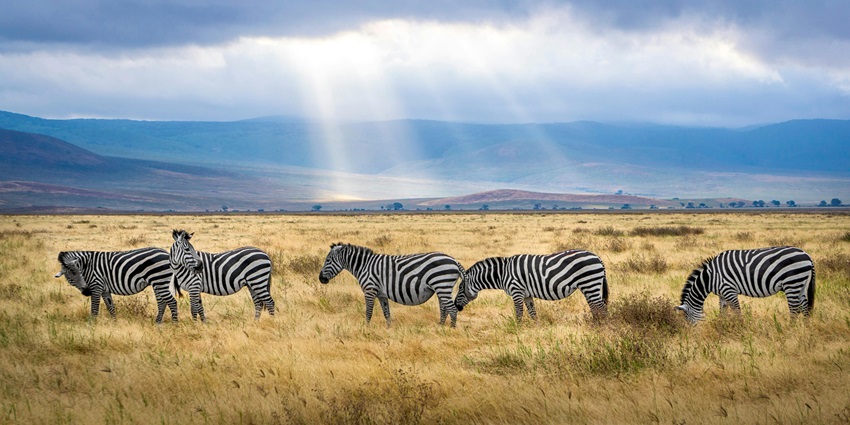
Photo: Hendrik Cornelissen / Pexels / Image For Representation Only
By Air: The nearest airport to Sardarpur Wildlife Sanctuary is Devi Ahilya Bai Holkar Airport, located in Indore, about 150 km away. You can hire a taxi from the airport or take a bus. It takes approximately 3-4 hours by road from Indore.
By Bus: Regular buses link Sardarpur with key cities such as Indore, Ujjain, and Dhar. Tours can be made from Indore by state or private bus services, which is very convenient.
By Rail: The closest railway station is at Ratlam, about 90 km from Sardarpur Wildlife Sanctuary. Ratlam is a major railway junction well-linked with different cities in India. You can hire a taxi from Ratlam or board a bus to reach Sardarpur in approximately two hours.
Places To Visit Near Sardarpur Wildlife Sanctuary
Exploring the Sardarpur Wildlife Sanctuary and its surrounding areas offers a unique natural beauty, history, and culture blend. Here are five notable places you shouldn’t miss:
1. Mandu
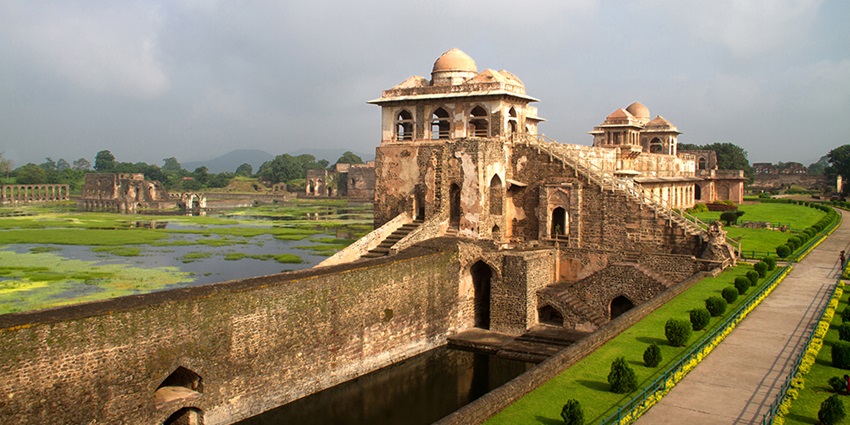
Photo: Prasad Mantri / Wikimedia Commons
About 100 km from the Sardarpur Wildlife Sanctuary, Mandu is a treasure trove of history — a city that has been humorously tagged the City of Joy. This ancient city is famous for its Afghan architecture. The various monuments found here are truly remarkable, like the Jahaz Mahal, which appears to stand floating between two lakes, and the Hindola Mahal, with its peculiar sloping walls. The Pavilion of Rani Roopmati has a breathtakingly beautiful view of the Narmada River and is full of romantic legends.
Timings: 6 AM – 6 PM
Entry Fee: ₹ 40 for Indians, ₹ 600 for foreigners
Suggested Read: Gandhi Sagar Wildlife Sanctuary
2. Patalpani Waterfall
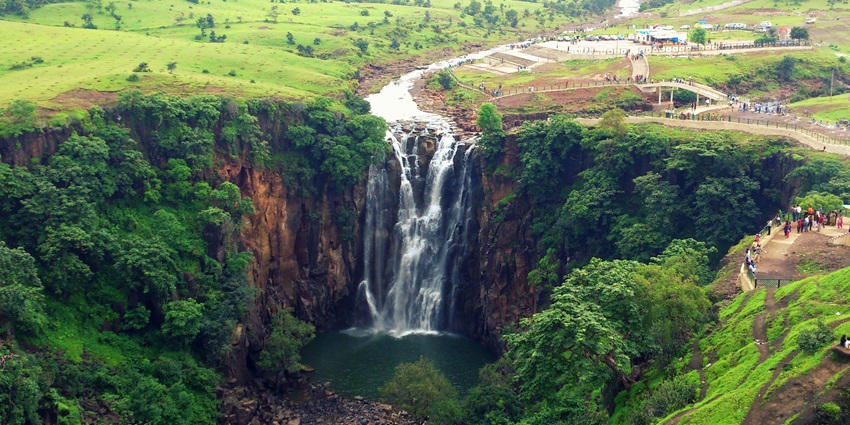
Photo: Vivek Shrivastava / Wikimedia Commons
WaterFall Patalpani is situated approximately 130 km from the Sardarpur Wildlife Sanctuary. Patalpani is one of the most beautiful waterfalls in nature. This stunning waterfall falls from an elevation of about 300 feet and becomes all the more spectacular during the monsoon season when the area around it gets lush green. While sundry beauty is found in this place throughout the year, visiting during or just after the monsoons will provide the most beautiful views of cascading water.
Timings: 8 AM – 5 PM
Entry Fee: None
3. Dhar Fort
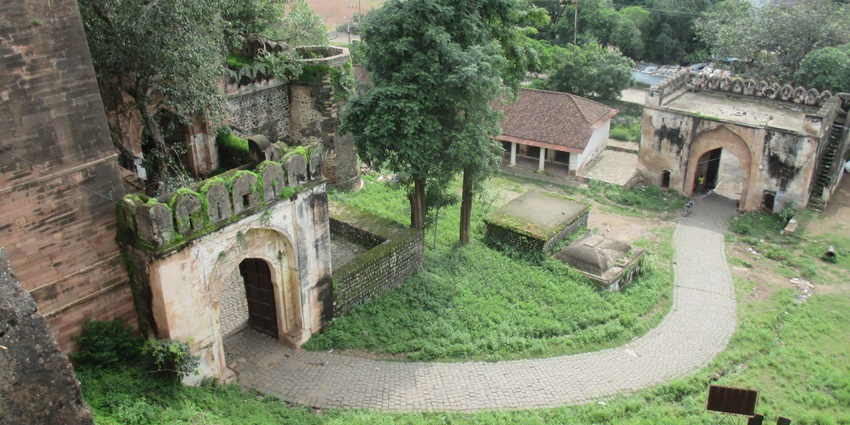
Photo: Uchcharia / Wikimedia Commons
Dhar Fort, located around 50 km from Sardarpur Wildlife Sanctuary, is a historically significant fort that dates back to the 14th century. Muhammad bin Tughlaq built this ancient structure and has witnessed several important events in India’s history. The fort’s architecture is an intriguing mix of Mughal and Maratha styles, with its grand gates, ramparts, and courtyards. Visitors can explore the fort’s expansive grounds and admire the beautiful blend of cultures.
Timings: 9 AM – 5 PM
Entry Fee: None
Suggested Read: Rani Durgavati Wildlife Sanctuary
4. Maheshwar
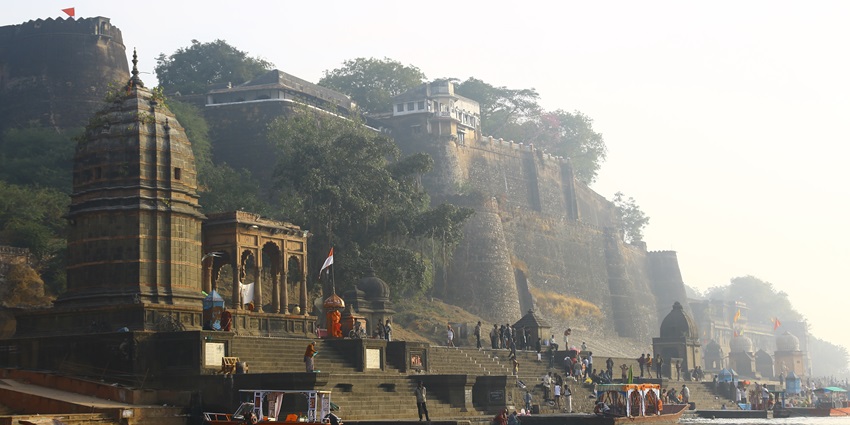
Photo: Lukas Vacovsky / Wikimedia Commons
Maheshwar, a tranquil riverside town situated about 170 km from the Sardarpur Wildlife Sanctuary, is renowned for its historical significance and vibrant handloom industry. The town’s charm lies in its serene ghats along the Narmada River, where you can visit the majestic Ahilya Fort. This beautifully preserved structure once served as the residence of Queen Ahilyabai Holkar. Maheshwar is also famous for its exquisite handwoven Maheshwari sarees.
Timings: 6 AM – 7 PM
Entry Fee: None
5. Bagh Caves
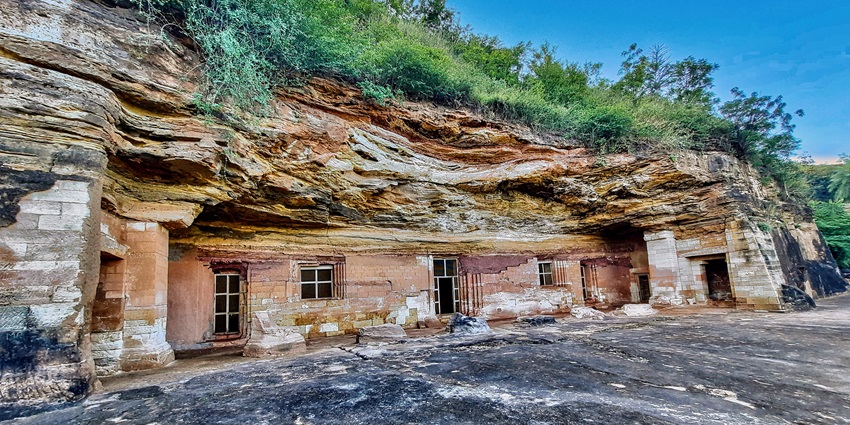
Photo: Ms Sarah Welch / Wikimedia Commons
The Bagh Caves, located around 60 km from the Sardarpur Wildlife Sanctuary, are a group of ancient rock-cut Buddhist caves that date back to the 5th century. These caves are famous for their intricate carvings and wall paintings, which are believed to have been inspired by the Ajanta Caves. The art within the caves is a remarkable example of ancient Indian craftsmanship, showcasing scenes from Buddha’s life and other religious themes.
Timings: 9 AM – 5:30 PM
Entry Fee: ₹ 25 for Indians, ₹ 300 for foreigners
Suggested Read: Forsyth Lodge Satpura National Park
Where To Stay

Photo: Pixabay / Pexels / Image For Representation Only
There aren’t many accommodations within the Sardarpur Wildlife Sanctuary, but nearby towns like Dhar and Indore offer a range of options. Visitors can choose from budget hotels, mid-range stays, and luxurious resorts. Some eco-friendly lodges are also close to the sanctuary, offering a rustic yet comfortable experience. To secure a good spot, ensure you book your stay in advance, especially during peak season.
Where To Eat

Photo: Niranjan.gohane / Wikimedia Commons
While the Sardarpur Wildlife Sanctuary has few dining options, you can find a few small eateries offering local dishes around the area.Some of these options are Patidar restaurant, Agrawal restaurant, Shree Ram Bhojanaliya and Satnam Dhaba. Indore, a little further away, is known for its street food, particularly poha, jalebi, and snacks like kachoris.
Suggested Read: Best Places To Visit In Indore For Food & Cultural Exploration
Best Time To Visit Sardarpur Wildlife Sanctuary
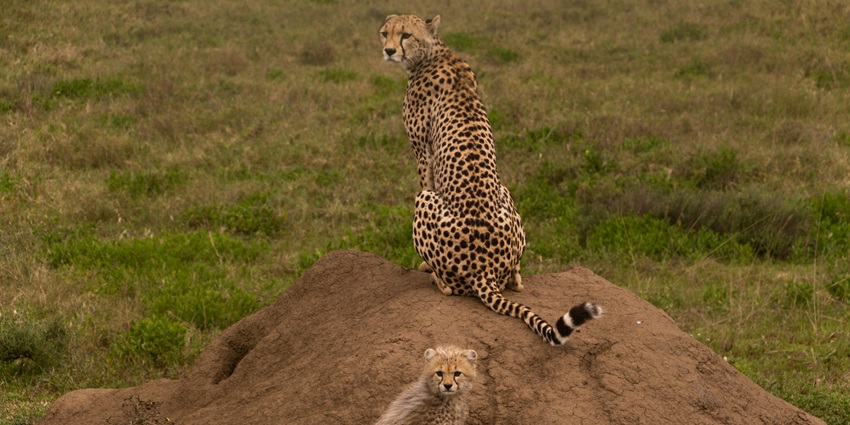
Photo: Joe Francis Kiaga / Pexels / Image For Representation Only
The best time to visit the Sardarpur Wildlife Sanctuary is from October to March when the weather is pleasant and the wildlife is more visible. The monsoon season (July to September) brings lush greenery, making the sanctuary even more beautiful. The winter months, on the other hand, offer a pleasant climate for wildlife enthusiasts and birdwatchers to explore the sanctuary without discomfort.
Other Factors To Consider
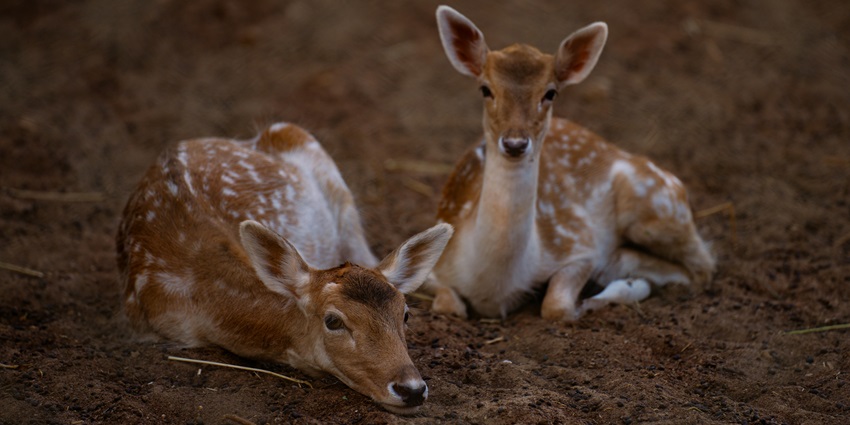
Photo: Tahamie Farooqui / Pexels / Image For Representation Only
Average Cost of the Trip
The trip cost to Sardarpur Wildlife Sanctuary can be relatively affordable. The Sardarpur Wildlife Sanctuary ticket price is minimal, and accommodation ranges from ₹ 1,000 to ₹ 5,000 per night, depending on your stay type. Meals and transportation costs are also reasonable, making this a budget-friendly trip for most travellers.
Tips For Travellers
- Carry light clothing during the summer and warm clothes during winter.
- Remember to bring a good pair of binoculars for wildlife spotting and to take a stunning Sardarpur Wildlife Sanctuary photo.
- Follow the forest department guidelines to ensure the sanctuary’s safety and preservation.
- Check the Sardarpur Wildlife Sanctuary timings before planning your safari.
- Carry sunscreen, a hat, and sunglasses, especially if you plan to explore the refuge during the day.
- Packaging snacks and water is advisable, as facilities within the sanctuary are limited.
Suggested Read: National Parks In Madhya Pradesh For An Unforgettable Experience
The Sardarpur Wildlife Sanctuary offers a peaceful retreat for nature lovers and a chance to witness the beauty of the wild in its natural habitat. With rich biodiversity, scenic landscapes, and a plethora of attractions nearby, it’s a perfect destination for a weekend getaway. For those planning a visit to Sardarpur Wildlife Sanctuary, don’t miss out on booking your trip with TripXL, ensuring a seamless and unforgettable wildlife adventure!
Cover Photo: Frans van Heerden / Pexels / Image For Representation Only


 WhatsApp
WhatsApp
 Twitter
Twitter









